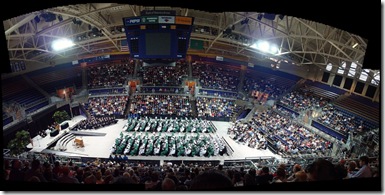Do children still need college?
 At high school graduation, the principal proudly read the statistics about where the graduates were headed after the summer. A third were going on to four year colleges and universities. 14% will attend to two-year colleges; 7% are going to vocational or trade schools. And the remainder, 36%, had chosen "Ministries and missions, military, travel, time-off, or undecided".
At high school graduation, the principal proudly read the statistics about where the graduates were headed after the summer. A third were going on to four year colleges and universities. 14% will attend to two-year colleges; 7% are going to vocational or trade schools. And the remainder, 36%, had chosen "Ministries and missions, military, travel, time-off, or undecided".
It's been a buzz among parents for the last few days: 36% seems remarkably high. I don't know what the trend is, or how it compares to other regions of the US or Western Europe, but I would have expected the number to be less than half of that.
What's happening?
Economics could play a role: college is unbelievably expensive. Four-year expenses at a private university cost a family a quarter-million dollars; state schools run about half that amount. But Woodinville is fairly well-off, and most families use savings or home equity, supplemented by student loans and small scholarships. Someone suggested that, with Microsoft nearby, maybe we were too well-off: the trust fund children didn't need schools or jobs. 'maybe in isolated cases, but not 160 children.
Dori, the commencement speaker, made the observation that a 3.6 grade point average (out of 4.0) is only good enough to get onto the waiting list at the University of Washington, a state school. The level of competition for limited openings is intense, and many kids may just drop out of the race along the way. But then I would have expected the numbers for two-year and vocational schools to be higher.
I think that the answer lies with a qualitative shift in how kids view the value of college. I've heard two arguments against it.
Skills learned in school are not relevant to later careers. Core classes, taken during the first two years, broadly encompass general education requirements. Students struggle with topics that don't interest them, that they aren't good at, or that teach skills that they will never use. It has a double effect, since poor performance may deny them entry to upper-level specialized programs.
The college degree no longer has value. Look at all of the graduates who are taking entry-level jobs that they could have gotten without the four-year investment. Surely it would make more sense to enter the market immediately and to have the experience instead. And the schools themselves have been rebranding as lifestyle choices, softening the academic message in favor of their social communities and scenic locations.
I suspect that parents with marginal economic means or free-market social outlooks will not push back when their child says that they aren't interested or don't feel ready for college.
Whatever the reason, I am concerned about the statistic.
Because, yes, children need college.
Education is still the only path to acquire the skills needed for today's careers. Few careers have entry paths through training and apprenticeship: kids cannot work their way up from unskilled positions into marketing, engineering, or finance roles. Universities further provide a diverse academic environment where interests can be explored and future paths chosen.
Colleges provide a transitional environment bridging home and independent adult life. The social circle gained through dormitory life and campus activities form your first network of diverse and close relationships beyond your home town.
I've watched my kids, and others, struggle to get an economic foothold via a string of entry-level jobs, further trying to make time to grow a social life while living at home and working 50 hours a week.
Paths around continued education are much more difficult to manage, and success is much less assured. I do think that we need to understand why a the third of the graduating class makes the choice to turn away from continued education, and either support an alternative or change the perceptions that motivate it.
Photo credit WWU via stateuniversity.com
Labels: Education, US Perspectives

























